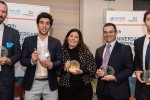ARCHIVE ACTIVITY
06 December 2017
Iniziative (EN) -
Federazione Anna Lindh Italia - Onlus (EN)

Brussels, 6 December - Winners of the 10th edition of the Mediterranean Journalist Awards were announced by HRH Princess Rym Ali of Jordan at the International Bestowing Ceremony that took place in the premises of the European Parliament in Brussels. The event brought together the Mediterranean Journalist Awards Alumni, young leaders from across the Euro-Med region and civil society and international organization representatives.
The Winners of the 10th Edition of the Mediterranean Journalist Awards were selected during the Jury Members meeting that took place on the same day. Princess Rym Ali headed the International Jury committee of the 2017 Awards: Naglaa Emary, media expert; Gisele Khoury, President of the Samir Kassir Foundation; Robert Parsons, Senior editor at France 24; Paola Parri, Deputy Secretary General of COPEAM; Michael Thoss, Allianz of Civilization; and Boyko Vassilev, Bulgarian National Television.
The Winners of the 10th Edition of the Mediterranean Journalist Award are:
PRESS CATEGORY
Annalisa Camilli for “Le bateau sans nom”, published in XXI Internazionale Magazine.
For six months, journalists Annalisa Camilli and Léna Mauger have investigated the deadliest shipwreck that took place on April 18th 2015, searching the 28 survivors, who are now living all over Europe and through their testimonies they recreate a choral account of the tragic event, made by the witnesses. The Jury members highlighted that “the article is a good practice of investigative journalism. The journalist succeeded to put a name to the faces of the ‘boat without a name'". The illustrations used in the article compliment the story-telling process.”
ONLINE MEDIA CATEGORY
Umberto Bacchi for “Organic yogurt wins migrants’ freedom from exploitation in Italy”, published in Thomson Reuters Foundation.
The article tells the story of a group of African migrants who set up an organic yogurt business in Italy. After several years working in exploitative conditions on fruit and vegetable farms, a riot forced them to rethink their situation and take control of their own future. They now run a small social enterprise that has been praised by the UN as an example of sustainable agricultural development. The jury members said: “In the article, refugees are seen as an added value and not a liability. It challenges the classic narrative adopted when reporting about migration. The article presents a new narrative of hope”.
RADIO AND TELEVISION CATEGORY:
Jaafar Abdul-Karim for “Does the Arab World need a women's rights revolution?”, broadcast in Deutch Welle.
This Shabab Talk episode, aired in the framework of the Global Media Forum, opens a debate about the issue of gender inequality in the Arab World. Since 2015, the show toured the Arab World to report on challenges facing the younger generations in the countries of the MENA region including: Jordan, Morocco, Egypt, Lebanon, Tunisia, Qatar, Sudan, Libya, Iraq and Mauritania. The jury members said: “The episode took us on a journey to know all aspects of the story. The work conveyed a clear message: Rules can change. And at the end of the episode, we were left with the real impact”.
PHOTOGRAPHY CATEGORY
Darrin Zammit Lupi for “Rescue on the Mediterranean” published in Reuters Wider Image.
Works were shot over the Easter weekend (14 to 16 April) in 2017 during a series of back-to-back migrant rescues at sea carried out by the NGO Migrant Offshore Aid Station (MOAS) a few miles of the Libyan coast. Jury members underlined: “The photo of the smiling mother with her baby speaks a thousand words. The work gives hope and highlights some happy endings to a tragedy”.
SPECIAL ALUMNI CATEGORY
Iason Athanasiadis was selected as winner for the Category “Special Alumni Award” for his commitment to telling stories of intercultural dialogue practice through his photographic works. Iason is a Mediterranean-focused multimedia journalist reporting from several Euro-Med cities including Athens, Istanbul and Tunis. He mainly reports on how, once-cosmopolitan port cities, are trying to adapt to the era of climate change, mass migration and extremism.
PER SAPERNE DI PIÙ:






